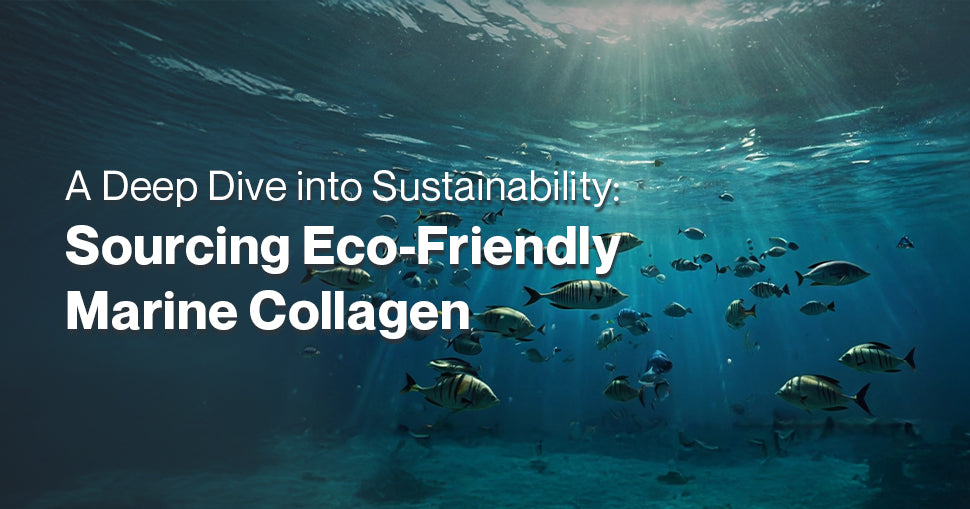A Deep Dive into Sustainability: Sourcing Eco-Friendly Marine Collagen
15 Jan 2025
The global demand for collagen has surged in recent years, driven by its proven benefits for skin health, joint support, and overall wellness. Among the many types available, marine collagen stands out for its superior bioavailability and eco-friendly sourcing potential. But what makes marine collagen truly sustainable, and why should we prioritize eco-friendly practices in its production? Let’s dive deep into the world of marine collagen, exploring its benefits and the importance of sourcing it responsibly.
What is Marine Collagen?
Marine collagen is a type of protein derived from the skin, scales, and bones of fish. It is rich in type I collagen, the most abundant collagen type in the human body, which is responsible for maintaining the structure and elasticity of skin, tendons, and bones. Unlike bovine or porcine collagen, marine collagen is renowned for its high absorption rate, making it a popular choice for supplements targeting skin health and anti-aging.
Collagen Benefits: Why is it Essential?
Collagen is the primary structural protein in the body, acting as the glue that holds everything together. However, as we age, natural collagen production declines, leading to wrinkles, sagging skin, and joint discomfort. Supplementing with collagen, particularly marine collagen, offers numerous benefits:
-
Collagen Benefits for Skin:
-
Improves skin elasticity and hydration.
-
Reduces the appearance of fine lines and wrinkles.
-
Supports a smoother, firmer complexion.
-
Joint and Bone Health:
-
Strengthens cartilage and reduces joint pain.
-
Promotes bone density and reduces the risk of fractures.
-
Hair and Nail Growth:
-
Encourages thicker, shinier hair.
-
Strengthens brittle nails.
-
Gut Health:
-
Supports the gut lining, aiding digestion and reducing inflammation.
With such a wide array of benefits, it’s no wonder that marine collagen has become a staple in the wellness industry. However, its growing popularity also raises concerns about sustainability.
The Environmental Impact of Collagen Production
Traditional collagen production, particularly from bovine and porcine sources, can contribute to significant environmental challenges, including:
-
High greenhouse gas emissions from livestock farming.
-
Overexploitation of land and water resources.
-
Generation of waste and byproducts that are often discarded irresponsibly.
Marine collagen offers a more sustainable alternative, provided it is sourced and processed responsibly.
What Makes Marine Collagen Sustainable?
Marine collagen is derived from fish byproducts, such as skin and scales, which would otherwise be discarded during fish processing. This approach aligns with the principles of a circular economy, where waste is minimized, and resources are reused. Here’s how marine collagen can be sustainably sourced:
-
Utilizing Byproducts:
-
Instead of contributing to waste, marine collagen production repurposes fish byproducts, reducing environmental impact.
-
Supporting Sustainable Fisheries:
-
Sourcing from fisheries that adhere to sustainable practices ensures that marine ecosystems remain balanced and biodiversity is preserved.
-
Minimizing Carbon Footprint:
-
Marine collagen production typically requires less energy compared to bovine or porcine collagen, resulting in a lower carbon footprint.
-
Eco-Friendly Processing:
-
Using enzymatic hydrolysis, a gentle and environmentally friendly process, ensures that marine collagen retains its bioactive properties without harmful chemical waste.
Challenges in Sourcing Eco-Friendly Marine Collagen
While marine collagen has the potential to be more sustainable, there are still challenges to overcome:
-
Overfishing:
-
Unsustainable fishing practices can deplete fish populations and disrupt marine ecosystems. It’s crucial to source collagen from fisheries certified by organizations like the Marine Stewardship Council (MSC).
-
Traceability:
-
Ensuring that marine collagen is sourced responsibly requires robust traceability systems to track the origin of raw materials.
-
Plastic Pollution:
-
The fishing industry contributes to marine plastic pollution. Collagen producers must work with suppliers committed to reducing plastic waste and cleaning up the oceans.
How to Identify Eco-Friendly Marine Collagen
As a consumer, you can make informed choices by looking for marine collagen products that prioritize sustainability. Here are some key indicators:
-
Transparent Supply Chains:
-
Brands that disclose their sourcing and processing methods are more likely to prioritize sustainability.
-
Third-Party Testing:
-
Independent testing ensures that the collagen is free from contaminants and sourced responsibly.
Innovations in Sustainable Collagen Production
The collagen industry is evolving, with innovative solutions aimed at improving sustainability:
-
Algae-Based Collagen:
-
Although still in development, plant-based collagen alternatives derived from algae offer a promising solution for those seeking vegan and sustainable options.
-
Integrated Aquaculture:
-
Combining fish farming with algae or shellfish cultivation can create symbiotic systems that enhance sustainability.
-
Upcycling in Other Industries:
-
By collaborating with industries like cosmetics or agriculture, collagen producers can find additional uses for byproducts, reducing waste further.
The Future of Marine Collagen
The future of marine collagen lies in striking a balance between meeting consumer demand and preserving marine ecosystems. As more consumers prioritize sustainability, the industry is likely to see:
-
Increased Regulation:
-
Governments and international bodies may implement stricter regulations to ensure sustainable fishing and collagen production practices.
-
Technological Advancements:
-
Innovations in extraction and processing methods can further reduce the environmental impact of marine collagen.
-
Consumer Awareness:
-
Educating consumers about the importance of sustainable collagen sourcing will drive demand for eco-friendly products.
Why Choose Eco-Friendly Marine Collagen?
By choosing marine collagen sourced through sustainable practices, you’re not only investing in your health but also contributing to the well-being of our planet. Here’s why it matters:
-
Protecting Marine Ecosystems:
-
Sustainable practices help maintain biodiversity and prevent overfishing.
-
Reducing Waste:
-
Utilizing fish byproducts minimizes waste and promotes a circular economy.
-
Lowering Carbon Emissions:
-
Supporting eco-friendly collagen production reduces your carbon footprint.
-
Setting an Example:
-
Your choices as a consumer can influence the industry to adopt more sustainable practices.
Conclusion
Marine collagen like Setu Skin: Youthful offers unparalleled benefits for skin health, joint support, and overall wellness. However, its production must align with sustainable practices to ensure that it doesn’t come at the expense of our planet. By prioritizing eco-friendly sourcing, we can enjoy the collagen benefits for skin and beyond while safeguarding marine ecosystems for future generations.
The next time you shop for marine collagen, look for products that emphasize sustainability. Your choices can make a difference—for your health and the health of our planet. Together, we can pave the way for a more sustainable future, one supplement at a time.
Skin: Youthful with Marine Collagen & Ceramosides™
- ₹1,694
- ₹1,694
-
₹2,200 - ( 23% OFF)
Categories
- Choosing a selection results in a full page refresh.
- Press the space key then arrow keys to make a selection.
this is the sidecart















